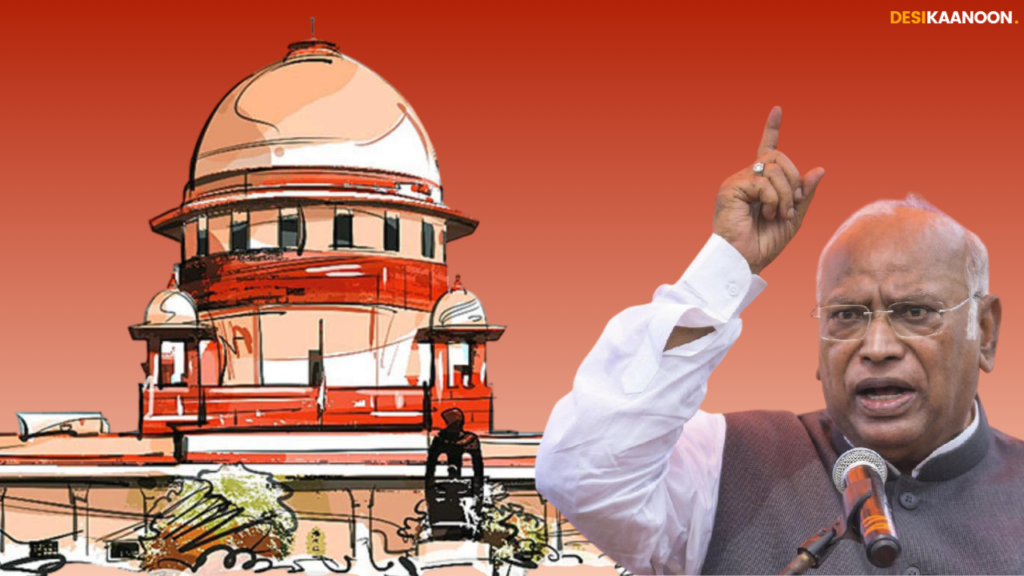Aastha Pareek
On Friday, October 18, the Supreme Court of India stayed a judgment passed by a High Court, which had refused to quash a criminal case filed against a person accused of calling Congress President Mallikarjun Kharge “ayogya” (meaning “incompetent”). The top court’s decision brings to light pertinent issues surrounding freedom of speech, political discourse, and the limits of defamation under Indian law.
Background
The controversy originated when the accused allegedly made derogatory remarks against Kharge during a political rally. These remarks were perceived as defamatory, leading to the registration of a criminal complaint under Section 500 of the Indian Penal Code, 1860, which deals with defamation. The accused filed a petition in the High Court seeking to quash the case, arguing that his statement fell under the ambit of free speech as guaranteed under Article 19(1)(a) of the Indian Constitution.
However, the High Court dismissed the petition, holding that the remark “ayogya” was indeed defamatory, and the case merited judicial scrutiny. Aggrieved by this decision, the petitioner approached the Supreme Court, seeking a stay on the High Court’s order and the quashing of the criminal proceedings.
Legal Issues Involved
1. Defamation and Political Criticism:
The key issue in the case revolves around whether calling a political leader “incompetent” qualifies as defamatory under Section 499 and 500 IPC. The legal question arises whether such remarks, made in the heat of political discourse, can be considered an attack on the individual’s reputation or are merely part of robust political criticism.
2. Freedom of Speech vs. Reputation:
Article 19(1)(a) guarantees the right to free speech, but it is subject to “reasonable restrictions” under Article 19(2), which includes restrictions for defamation. Courts have long held that public figures, including politicians, must tolerate a higher degree of criticism, as it comes with their role in public life. The challenge is to balance the individual’s right to protect their reputation with the democratic necessity of free political speech.
3. Public Interest Defense:
Another pertinent defense in defamation cases involving politicians is the element of “public interest.” The accused is likely to argue that the remark was not made with malicious intent but was a form of political critique, raising questions of competence in governance, which is a matter of public interest.
The Supreme Court’s Intervention
Recognizing the complexity of these legal issues, the Supreme Court has stayed the High Court’s order, granting interim relief to the petitioner. The stay indicates that the apex court will now thoroughly examine whether the statement “ayogya” constitutes defamation or whether it falls within the realm of permissible political criticism.
In previous cases, such as Subramanian Swamy v. Union of India (2016),the Supreme Court upheld the constitutional validity of criminal defamation while emphasizing the need to strike a balance between free speech and the right to reputation. This case will likely build upon that precedent and further clarify the contours of defamation in political contexts.
Implications
The Supreme Court’s eventual ruling could have far-reaching consequences for political discourse in India. A decision in favor of the petitioner could potentially widen the scope for political criticism and safeguard individuals from frivolous defamation suits in the heat of electoral politics. On the other hand, a ruling against the petitioner could reaffirm the courts’ commitment to protecting individual reputation, even in political debates.
This case once again highlights the tension between free speech and defamation laws, particularly in a political climate where robust criticism and personal attacks often blur the line between legitimate dissent and defamatory speech. As the case proceeds, the court’s decision will be closely watched, given its potential to shape the future of political dialogue in India.
Conclusion
The Supreme Court’s stay on the High Court judgment brings to the fore critical questions about the intersection of law, politics, and free speech. As political leaders continue to be subjected to intense public scrutiny and criticism, this case will serve as a landmark in determining how far political speech can go without crossing the line into defamation.
The ultimate verdict, when delivered, will not only clarify legal principles surrounding defamation in the political arena but also reinforce the constitutional balance between free speech and individual dignity in a vibrant democracy like India.
Case Name:- Mithun Chakravarty Devidas v. The State of Karnataka
Case Number:- [SLP(Crl) No. 014305 /2024]
Bench:- Justices MM Sundresh and Pankaj Mithal
Click here to access the order.

